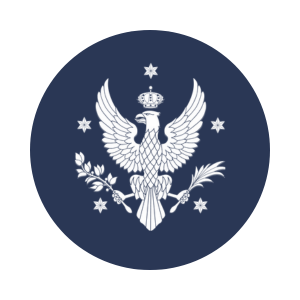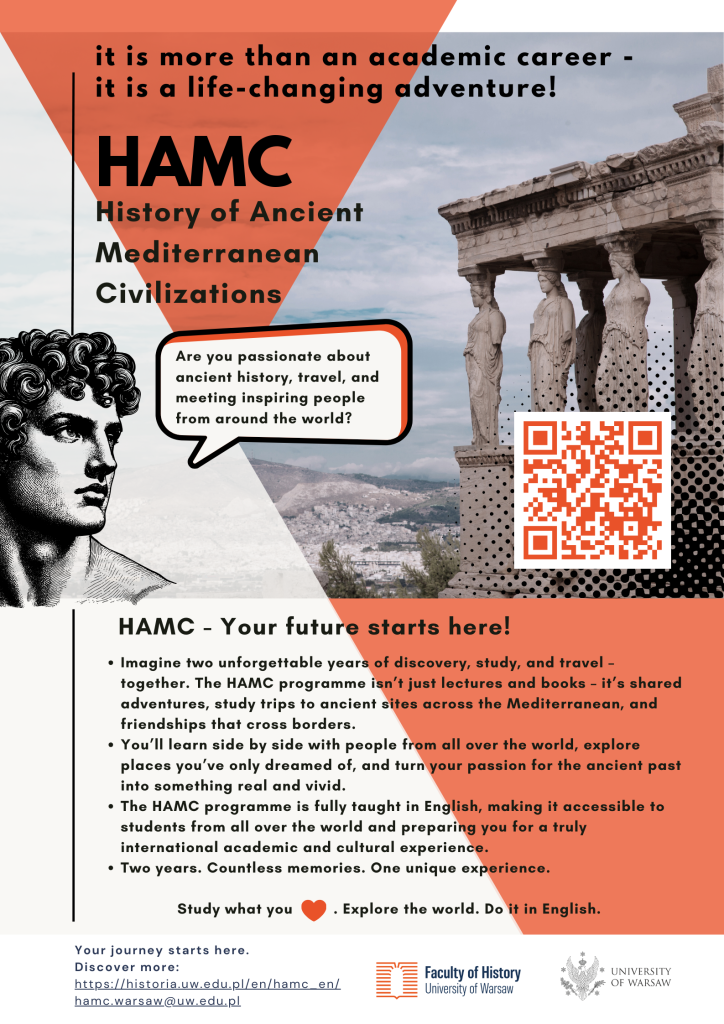History of Ancient Mediterranean Civilizations
History of Ancient Mediterranean Civilizations |
|
 |
LEVEL OF PROGRAMME M.A. Programme, diploma in ancient history |
 |
DURATION 2 years |
 |
LANGUAGE OF INSTRUCTION English |
 |
PROGRAMME CAPACITY 25 persons (minimum 8 persons) |
 |
START DATE October |
 |
APPLICATION DEADLINES coming soon Registration via the IRK website |
 |
FEES
We offer a free English-language education |
 |
CONTACT hamc.warsaw@uw.edu.pl |
Why apply to the University of Warsaw?
→ The University of Warsaw — a leader in education and research
 |
The University of Warsaw (UW) is consistently ranked as the top university in Poland and one of the leading academic institutions in Central and Eastern Europe, according to international rankings. Annual evaluations confirm the high quality of education at UW. Both students and alumni express strong satisfaction with their academic experience and educational outcomes.
Surveys tracking alumni career paths show that a University of Warsaw degree offers a clear advantage on the job market — 94% of graduates successfully find employment shortly after completing their studies. |
→ The Faculty of History — excellence in the humanities
The Faculty of History at the University of Warsaw is recognized as one of Poland’s premier humanities research and teaching centres. We educate professionals equipped with interdisciplinary skills, capable not only of exploring the past, but also of interpreting the present through the historical roots of today’s political, social, economic, and cultural developments.
Our faculty conducts cutting-edge research in a wide range of fields — from the history of the ancient world and non-European civilizations, to auxiliary historical disciplines such as papyrology, epigraphy, and numismatics. These research activities play a crucial role in shaping the direction and scope of historical studies in Poland.
We are proud of our long-standing academic tradition. The Faculty — originally established as an institute — began its work in the 1930/1931 academic year and continues to thrive as a hub of innovative scholarship and high-quality education.
The University of Warsaw — a leading European centre for ancient studies
The University of Warsaw is uniquely equipped to offer comprehensive education and research in the field of ancient history. What sets UW apart is its exceptional team of scholars — unmatched not only in Poland but rare even on the European scale.
Our community of antiquity researchers includes experts in highly specialized and globally unique disciplines:
- Nubiology – conducted at the Faculty of Archaeology and the Centre for Mediterranean Archaeology
- Papyrology – at the Faculty of Archaeology and the Faculty of Law and Administration
- Roman law in papyri – at the Faculty of Law and Administration
- Epigraphy – jointly explored by the Faculty of Archaeology and the Faculty of History
- Hittitology, Akkadian, and Sumerian studies – at the Faculty of Oriental Studies
Additionally, ancient history and classical philology are actively taught and researched at the Faculty of History and the Institute of Classical Philology (Faculty of Polish Studies), respectively.
→ A hub of global research and archaeological missions
Thanks to its size, scope, and outstanding academic quality, the University of Warsaw has become an internationally recognized centre for the study of the ancient world. A prime example is the Centre for Mediterranean Archaeology, directed by Dr hab. Artur Obłuski, which coordinates archaeological missions at sites of international significance.
The Centre’s activities span regions including:
- Northeast Africa and the Middle East: Egypt, Sudan, Syria, Iraq, Jordan, Lebanon, and Cyprus
- The Arabian Peninsula: Kuwait, Oman, UAE, Saudi Arabia
- The Caucasus: Georgia and Armenia
- North Africa: Tunisia
Noteworthy excavations have taken place at iconic sites such as Palmyra, Kom el-Dikka (Alexandria), Deir el-Bahari, Berenike (Egypt), Nea Paphos (Cyprus), Jiyeh and Khalde (Lebanon), Hatra (Iraq), and Mustis (Tunisia). Particularly important are long-term projects in Sudan, including Dongola, Banganarti, and Soba.
Both the Centre for Mediterranean Archaeology and the Faculty of Archaeology are recognized as global leaders in Nubiological studies, making a lasting contribution to the development and popularization of this field.
→ High-impact publications and prestigious research
 |
Our academic output regularly appears in leading international publishing houses such as Brill, Brepols, Oxford University Press, Harrassowitz, and Peeters. These works reflect both the extraordinary productivity and high scholarly standards of our faculty.
We are especially proud of UW-based journals that have earned global recognition:
The JJP Supplements series has gained such esteem that Peeters Publishers now oversees its production and distribution. |
→ ERC-funded projects and international recognition
Antiquity scholars at the University of Warsaw regularly secure competitive national and international grants, including those awarded by the European Research Council (ERC):
- “The Cult of Saints” — ERC Synergy project led at UW by Prof. Robert Wiśniewski, as part of a consortium with the University of Oxford
- “Masters of the Stone” (2022–2027) — ERC Starting Grant led by Dr Paweł Nowakowski at the Faculty of History ( Kamień trwalszy niż Cesarstwo Rzymskie. Otwiera się droga do nowego rozumienia zmian w antycznej Europie? )
- “UMMA – Urban Metamorphosis of a Medieval African Capital City” (2018–2023) — ERC Consolidator Grant by Dr hab. Artur Obłuski
- “Afropolis Tungul: Urban Biography of a Cosmopolitan African Capital” (2024–2029) — Dr Obłuski’s second ERC Consolidator Grant
→ International congresses hosted at UW
The University of Warsaw has hosted several major international conferences dedicated to ancient studies, strengthening its global academic position:
- 27th International Congress of Papyrology (2013)
- 8th International Congress on the Archaeology of the Ancient Near East (2012)
- Rencontre Assyriologique Internationale (2014)
- International Conference for Nubian Studies (2022)
- European Association of Biblical Studies Conference (2019)
- 16th International Numismatic Congress (2022)
About the programme
We invite students to apply for the two-year second degree programme “History of Ancient Mediterranean Civilizations” taught in English.
Ancient civilizations are an exciting field for conducting research, and numerous research sources open up possibilities for undiscovered interpretations of the past.
The master’s programme is highly interdisciplinary. The core curriculum is based on history (70%), archaeology (20%) and studies on culture and religion (10%).
|
We also offer general education classes on the ancient world. The obligatory canon of knowledge (e.g., Mesopotamian, Greek and Roman history, ancient literature and philosophy) has the possibility of broadening individual interests through the addition of class modules on early Christianity and literature, ancient Judaism, history of women, history of ancient slavery and discriminated groups, and the plurality of legal systems among other topics. The offer of tailor-made courses includes workshops that develop research competencies, such as reading groups and the intensive, practical course of an ancient language (e.g., Greek, Latin, Syriac, Aramaic, Akkadian, Coptic or Hebrew – the selection of languages is subject to change and depends on the availability of lecturers each year) to enable students to read and interpret ancient sources in their original languages. Students will also choose from a wide variety of courses such as epigraphy, papyrology, numismatics, ancient historiography, the interpretation of cuneiform texts or specialized classes in source criticism or the editing ancient texts. An additional module focuses on developing competences in digital humanities and academic writing. The module includes diverse workshops on the use of digital tools for text processing, in particular the editing and data processing used in the work of historians, papyrologists, epigraphers and numismatists. |
 |
A distinctive feature of this programme is the field training: not only practical geodata collection, but also an engrossing, Mediterranean tour, funded by the Faculty.
The small size of our courses fosters a collaborative educational environment and provides the opportunity for individual mentoring.
All abovementioned activities lead to the achievement of the primary objective of our programme: students’ proficiency in conducting high-quality research using a wide range of methods.
The studies conclude with a diploma in ancient history.
Profile of the graduate
What will you gain as a student in our program?
Our students acquire qualifications that make them stand out on the competitive job market. We teach critical thinking, asking meaningful questions, and looking at the world from different perspectives – skills that are highly valued not only in academic settings but also in broader fields of education.
Upon graduation, you will be well prepared for careers in cultural heritage protection, museum work, and public administration – both at the central and local levels – as well as in politics.
Our program also opens doors to work in NGOs, especially those focused on cultural heritage and diversity.
Graduates thrive in areas such as publishing, media, public relations, diplomacy, and international institutions. Skills like database management and graphic editing are increasingly in demand and are highly useful in today’s digital job market.
Those interested in academic careers will receive solid training for professional research work – whether in prestigious international projects requiring not only subject knowledge but also technical skills (especially in digital methods and specialized software/equipment), or when applying for their own research grants.
Study plan
| Year I | |||
| Semester I | |||
| Course | Form | Hrs | ECTS |
| M.A. Seminar | Seminar | 30 | 4 |
| Practical course of an ancient language | Language course / Reading group | 60 | 3 |
| Seminar class in source studies I | Seminar classes | 30 | 4 |
| Lecture in ancient history I | Lecture | 30 | 2 |
| Academic writing | Seminar classes | 30 | 3 |
| Elective courses | Elective | 60 | 8 |
| General university course (OGUN) in social sciences | Elective | minimum 60 | 6 |
| Year I | |||
| Semester II | |||
| M.A. Seminar | Seminar | 30 | 4 |
| Practical course of an ancient language | Language course / Reading group | 60 | 3 |
| Seminar class in source studies II | Seminar classes | 30 | 4 |
| Lecture in ancient history II | Lecture | 30 | 2 |
| Specialist lecture (elective) | Lecture e-learning | 30 | 2 |
| Introduction to the methodics of work with archaeological sources | Seminar classes | 30 | 3 |
| Interdisciplinarity in research on antiquity | Seminar classes | 30 | 4 |
| Elective courses | Elective | 30 | 5 |
| Spatial contextualization of archaeological sources | Lecture+ Field practical classes | 15+60 | 3 |
| Year II | |||
| Semester III | |||
| M.A. Seminar | Seminar | 30 | 4 |
| Practical course of an ancient language | Language course / Reading group | 60 | 3 |
| Cultural anthropology | Seminar classes | 30 | 4 |
| Archaeological reports in the historical research | Seminar classes | 30 | 4 |
| Digital instruments of research I | Seminar classes | 30 | 4 |
| Funding research and obtaining grants | Laboratory classes | 15 | 1 |
| Elective courses in history | Elective | 30 | 4 |
| Elective courses in archaeology | Elective | 30 | 3 |
| Elective courses in the study of culture and religion | Elective | 30 | 3 |
| Year II | |||
| Semester IV | |||
| M.A. Seminar | Seminar | 30 | 4+12 |
| Practical course of an ancient language | Language course / Reading group | 30 | 2 |
| Digital instruments of research II | Seminar classes | 30 | 4 |
| Elective courses | Elective | 60 | 8 |
Application rules
The admission procedure for candidates with a diploma obtained in Poland
The interview will take place in English on Zoom.
The admission procedure will be assessed from the results of the interview based on a topic selected by the candidate from the list of ten broad topics regarding the history, culture and religion of ancient Mediterranean and Mesopotamian civilizations, as published in the Internet Recruitment of Candidates (IRK) system.
- Diversity of political systems of the Greek poleis of the Archaic period.
- Athenian democracy in action: Institutions of the Athenian polis in modern research and in primary sources.
- Power and subjects: The diversity of the Achaemenid Empire
- The symptoms of change in the Hellenistic period based on chosen examples.
- Tradition and innovation in the political practice of the Late Roman Republic.
- Imperial ideology in antiquity based on selected examples.
- The Roman state and non-traditional cults.
- Crisis of the third century CE and its significance in politics, culture and religion.
- When does the ancient world end?
- The periods of the “dark ages,” or how archeology builds knowledge about a period without written sources.
Candidates will be assessed on a scale from 0 to 100 points. The interview begins with a 5–10 minutes discussion of the candidate’s chosen topic. Use of a multimedia slide show is permitted. After discussing the topic, committee members ask broad problem-oriented questions for approximately 20–25 minutes.
Subject to evaluation are: the candidate’s command of the basic primary and secondary sources on the chosen subject – the accuracy of the selection of the most important primary and secondary sources, knowledge of the broad context of the topic, and proficiency in English.
Admission to the full-time M.A.-level programme will be contingent upon obtaining a minimum of 30 points from the interview and submitting a set of required documents, including a university diploma, within the prescribed period. If the limit of places is not met, a second round of admissions will be conducted. Only university graduates will be able to participate. As in the first round, the condition for admission to full-time M.A.-level programme will be contingent upon obtaining a minimum of 30 points from the interview and the submission of a set of documents, including a university diploma, within the prescribed period.
Failure to achieve the minimum number of points at any stage of the admissions procedure results in the award of 0 (zero) points from the entire procedure and disqualification of the candidate.
Candidates with a foreign diploma
The same rules apply as for candidates with a diploma obtained in Poland.
Verification of English-language competency
A positive result of the qualifications procedure is tantamount to confirmation of the candidate’s competence to study in English at the above-mentioned programme (this applies to candidates who do not have a document recognized by the University of Warsaw confirming their command of English at least at B2 level).
Registration deadlines
Interview: 16-17 July 2025
Fees
We offer a free English-language education at the heart of one of the best universities in Central and Eastern Europe. The tuition fee applies only to non-EU students and is €3,000 per year.
Housing and social facilities
 |
The University of Warsaw offers more than 2,500 rooms in six residence halls located in different parts of the city. Each hall has a quiet study room, TV room, computer room and laundry facilities. Monthly rent ranges from 480 to 950 PLN (102 to 202 euros) per person, depending on the type of room and a dormitory.
You can find detailed information on social facilities here:
|
Scholarships
NAWA Zawacka Programme – the aim of the Programme is to deepen international academic cooperation through visits of students, doctoral students, academic teachers and researchers to Polish institutions of higher education and science, on the basis of international agreements concluded between Poland and the partner countries indicated in the announcement.
Applicants for participation in the Programme may include:
- secondary school graduates who, at the time of commencement of their studies in Poland, hold a school-leaving certificate giving them the right to take up studies in the country in which the certificate was issued in any field and type of university;
- students;
- higher education graduates applying for admission to the next level of education, who obtained their diploma no earlier than 2022;
- those with doctoral status in accordance with the rules of their country’s higher education and science system;
- researchers and academic teachers conducting research or teaching in a country participating in the Programme who are not employed by a Polish institution of the higher education and science system.
Contact
 |
Professor Jacek Rzepka was appointed as the contact person for those who would like to receive further details. You can ask him about the admissions process, the curriculum and courses.
e-mail: hamc.warsaw@uw.edu.pl |
Lectures
|
Can a Woman Be a Great Poet? A Few Words on the Reception of Sappho |
The petition of Dionysia, daughter of chairemon a witness of legal plurality in roman Egypt (p. oxy. II 237) |
|
Ancient Greeks and Their Time |
The Miracle of the Alban Lake or how far can we belive our sources on Early Rome? Professor Adam Ziółkowski |